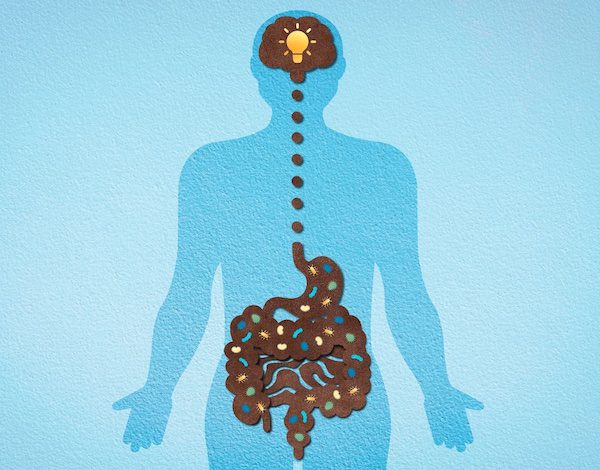
Research Finds A Link Between The Gut Microbiome & Preclinical Alzheimer’s
Acne, digestion issues, inflammation, and even some depression symptoms all have one thing in common: They’ve been linked to the gut microbiome. A new study suggests that Alzheimer’s may also have connections to the gut. Here’s what to know.
The possible link between the gut microbiome and Alzheimer’s
Dementia is currently the seventh leading cause of death and one of the major causes of disability globally among older people, with Alzheimer’s disease (AD) making up 60 to 70% of dementia cases.
There is currently no cure for AD. But the earlier you can spot signs of it, the better—and new insights on the gut microbiome’s relationship to dementia may help with early detection.
A recent study published in Science Translational Medicine found that the gut microbiomes of symptomatic patients with Alzheimer’s differed from those of cognitively healthy control individuals who ate a similar diet.
For the cross-sectional study, researchers took gut microbiome samples from 164 individuals—49 of whom had biomarker evidence of early, preclinical Alzheimer’s. Those with preclinical AD were more likely to have some specific gut bacteria than those who did not have preclinical AD.
Knowing these unique microbiome features could eventually help improve the accuracy, sensitivity, and specificity of AD testing, the researchers note. However, they have not concluded a causal relationship quite yet. Though they found a correlation between these microbiome features and preclinical AD, they can’t say for sure whether these microbiome changes cause dementia or the other way around.
All of this to say: This area of dementia research is still in its early stages, so more studies are needed. Nevertheless, this finding could have a profound impact on preclinical dementia treatment. The method of pulling a stool sample is much more accessible and affordable than many of the traditional methods such as spinal taps and brain scans.
4 ways to promote cognitive longevity
Until further research can confirm either way, it’s a good idea to focus on both your brain health and gut health to support a longer, healthier life. Here are a few of our favorite ways to do so:
- Tend to your microbiome
Take a probiotic: Taking a daily probiotic is one of the easiest ways to feed your gut with good bacteria, which will help to support a healthy functioning microbiome. Here at the Power Mall we offer several great probiotic options.
Cut down on sugar: Too much sugar can cause imbalances in your gut bacteria that can throw off your mood (nod to the link between your microbiome and mental health), so limit sugar when possible.
Eat diverse plants: “Aim to eat 30 different plants per week (from fruits, vegetables, nuts, seeds, legumes, and herbs)—or as many varieties as you possibly can,” says gut health expert and registered dietitian Heather Finley, M.S., R.D.
- Get enough high-quality sleep
Research shows that a lack of sleep contributes to stress, which can lead to an imbalance of good and bad bacteria. On the flip side, getting enough sleep (around seven to nine hours for adults) can help you manage the physical effects of stress, promoting healthy gut balance.
A healthy gut is also associated with better sleep quality. In other words, the more you do to increase the good bacteria in your gut, the better you may sleep.
If you have trouble sleeping, there are plenty of things you can do, like crafting a relaxing wind-down routine, avoiding blue light right before bed, and ditching the caffeine late in the day, to improve your sleep quality, and taking a melatonin free sleep aid like Herbal Zzz’s.
- Limit excessive alcohol consumption
Even moderate drinking—which research describes as seven drinks for women and 14 drinks for men per week (in total)—can contribute to brain damage. One 2022 study found that alcohol intake is negatively associated with global brain volume measures, regional gray matter volumes, and white matter microstructure. The affected brain regions include the frontal cortex, amygdala, and brain stem, to name a few—regions associated with creativity, memory, judgment, motor tasks, emotional regulation, heart rate, sleep, and more.
- Take a memory supplement
Once you establish your gut health protocol, you may also consider taking a high-quality memory supplement with science-backed ingredients (like Phosphatidylcholine—a fat-like molecule that is considered the predominant phospholipid of all cell membranes, especially in the brain, that’s been clinically shown to improve cognitive impairment).
The takeaway
New research found a correlation between the gut microbiome and markers of preclinical Alzheimer’s disease. Whether these gut microbiome features cause dementia (or the other way around) is still unknown. However, this research is a good reminder to find ways to tend to both your brain and gut health as you age.
Sources
- https://www.mindbodygreen.com/articles/research-finds-a-link-between-the-gut-and-preclinical-alzheimers
- https://www.who.int/news-room/fact-sheets/detail/dementia
- https://www.science.org/doi/10.1126/scitranslmed.abo2984
- https://www.ncbi.nlm.nih.gov/pmc/articles/PMC5532289/
- https://www.cdc.gov/sleep/about_sleep/how_much_sleep.html
- https://www.ncbi.nlm.nih.gov/pmc/articles/PMC6779243/
- https://www.nature.com/articles/s41467-022-28735-5
The information provided on the pages of this web site are intended as information only and are not a substitute for diagnosis and treatment by a physician or health care provider. If you have a health concern, please seek advice from a physician or healthcare provider specialized in your area of concern. Do not take it if you are pregnant or nursing. These products have not been evaluated by the FDA and are not intended to diagnose, treat, cure, or prevent any health condition or disease.



More Stories
Today’s News: March 26, 2024
12 Survival Uses for Bentonite Clay
The Greatest Purveyor of Violence In The World